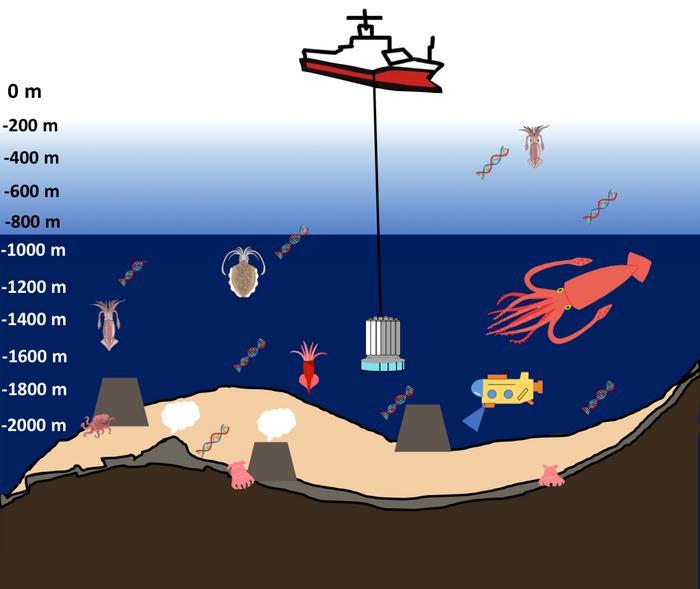In a groundbreaking development from Kobe University, researchers have unveiled a novel approach to studying cephalopods, such as squids and octopuses, utilizing advanced DNA probes. This innovative method harnesses the power of environmental DNA (eDNA) metabarcoding to efficiently survey the hidden lives of these elusive deep-sea creatures. As flagship species of marine ecosystems, cephalopods play an essential role in balancing the distribution of energy and nutrients within their habitats. Through this advancement, researchers aim to better understand their distribution and ecological importance, contributing to conservation efforts and marine ecological research.
The research team, led by marine ecologist WU Qianqian, recognized the critical need for effective methodologies in assessing species distribution in the deep sea, an area largely inaccessible to traditional direct surveys. The deep ocean remains one of Earth’s last frontiers, harboring a myriad of organisms whose ecological roles are largely underestimated or unknown. Wu emphasizes the urgency of this exploration: “The deep sea covers a large portion of Earth’s surface and is home to many unknown organisms whose ecology remains largely unexplored.”
The essence of the study revolves around a technique known as environmental DNA metabarcoding, which operates by collecting and analyzing DNA fragments shed into the marine environment by various organisms. In their methodological approach, the researchers devised specific probes, referred to as primers, that target particular DNA fragments associated with cephalopod species. This duality of specificity—narrow enough to identify species while broadly inclusive of various members within the group—poses a significant challenge during probe development.
Against a backdrop of marine biology, the researchers worked closely with specialists from the Japan Agency for Marine-Earth Science and Technology (JAMSTEC), combining their expertise in deep-sea sample collection with Kobe University’s distinguished environmental DNA research capabilities. This collaborative approach was fundamental in amassing the large volumes of deep-sea samples necessary for effective eDNA analysis.
In their findings published in the journal Marine Environmental Research, Wu and her team achieved remarkable success with the development of their universal DNA primers. These primers demonstrated the capacity to efficiently detect a broad range of cephalopod DNA, both in artificially created mock samples and in authentic sea samples collected from the ocean depths of Japan, reaching up to 2,000 meters. This pioneering detection of specific cephalopod species in their natural habitats represents not just an achievement but a significant leap in marine research technology.
One of the notable components that contributed to this success was the decision to target longer DNA fragments than had previously been utilized in related studies. While longer fragments historically present challenges such as increased degradation, the research team discovered that the cold, stable temperatures of the deep sea significantly mitigate these issues. Not only does this approach enhance the likelihood of retrieving “fresh” DNA that accurately reflects the species distribution, but it also enriches the sample’s genetic material, thereby ensuring more precise identification of individual species.
Interestingly, the researchers found that octopus DNA was exclusively detected in the deepest layers of the ocean. This observation is not merely a function of effective probe design but provides insight into the lifestyle adaptations of octopuses as predominantly solitary, ground-dwelling organisms. Their discovery offers researchers an opportunity not only to identify species presence but also to infer their ecological behaviors and life history traits based on collection location and habitat preferences.
However, the journey toward refining this pioneering technique does not end here. Wu acknowledges that continued research will necessitate adaptations in sample collection strategies to intertwine with the unique life cycles and behavioral patterns of various cephalopod species. As the study progresses, significant attention must also be directed toward resolving potential misidentifications stemming from inconsistencies within existing DNA databases. To address these issues, Wu emphasizes the need for strengthened collaboration between molecular biologists and taxonomy experts in the field.
The implications of this research extend well beyond mere academic interest; the methods and findings may serve as crucial steps toward advancing marine life conservation. By establishing a reliable means of monitoring cephalopod populations, scientists can formulate more effective strategies to protect these sensitive species and, by extension, the entire ecosystem in which they dwell.
Funding for this important research was provided by the Ministry of Environment of Japan, reflecting the study’s relevance to national ecological priorities. The collaborative efforts featured not only Kobe University but also included key partnerships with Kyoto University, the Osaka Museum of Natural History, the Natural History Museum and Institute, JAMSTEC, and the Okinawa Churashima Foundation. This united approach highlights the interdisciplinary nature of contemporary marine research, pooling diverse expertise to tackle the pressing questions surrounding oceanic biodiversity.
Given that Kobe University possesses a storied legacy in academia, dating back to its establishment in 1902, the institution remains at the forefront of comprehensive research initiatives in Japan. With its expansive resources and commitment to developing interdisciplinary scholars, Kobe University stands poised to make substantial contributions to our understanding of marine ecosystems and conservation efforts moving forward.
As the quest to unravel the mysteries of the deep sea continues, the research conducted by Wu and her team exemplifies the intersection of innovation and ecological responsibility. Their more profound insights into cephalopod biology may serve as the gateway to a broader understanding of marine ecosystems that hinge on the delicate balance of life in the ocean depths.
Subject of Research: Cephalopod diversity in deep-sea ecosystems
Article Title: Development of universal PCR primers for the environmental DNA metabarcoding of cephalopod (Mollusca) diversity
News Publication Date: April 14, 2025
Web References: Marine Environmental Research
References: Marine Environmental Research
Image Credits: WU Qianqian
Keywords: cephalopods, environmental DNA, metabarcoding, marine ecology, conservation, deep-sea research, DNA primers, Kobe University, species distribution, marine ecosystems




